|
Word Gems
exploring self-realization, sacred personhood, and full humanity
Soulmate, Myself:
Omega Point
| Part II, Existential Beauty: Consonance with the whole: “What is good is in consonance with creation as a whole and therefore also with the world of men. Whenever we see the Good and the True in perfect accord, the Beautiful stands revealed.” |
return to "contents" page
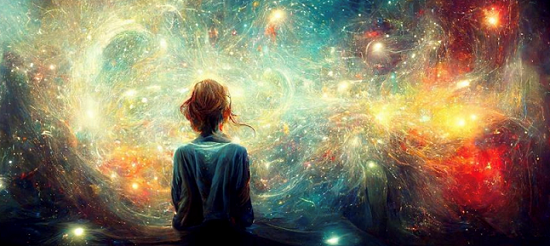

Kairissi. We’ve already offered a lot on the meaning of beauty. But, my deeper feelings say that we’ve hardly said anything at all. If someone asked me out-of-the-blue “what is beauty” I’d be stammering around.
Elenchus. It’s like trying to describe the shape of a nebula. It’s all rather amorphous.
K. A shapeless shape. Beauty is a giant gas cloud.
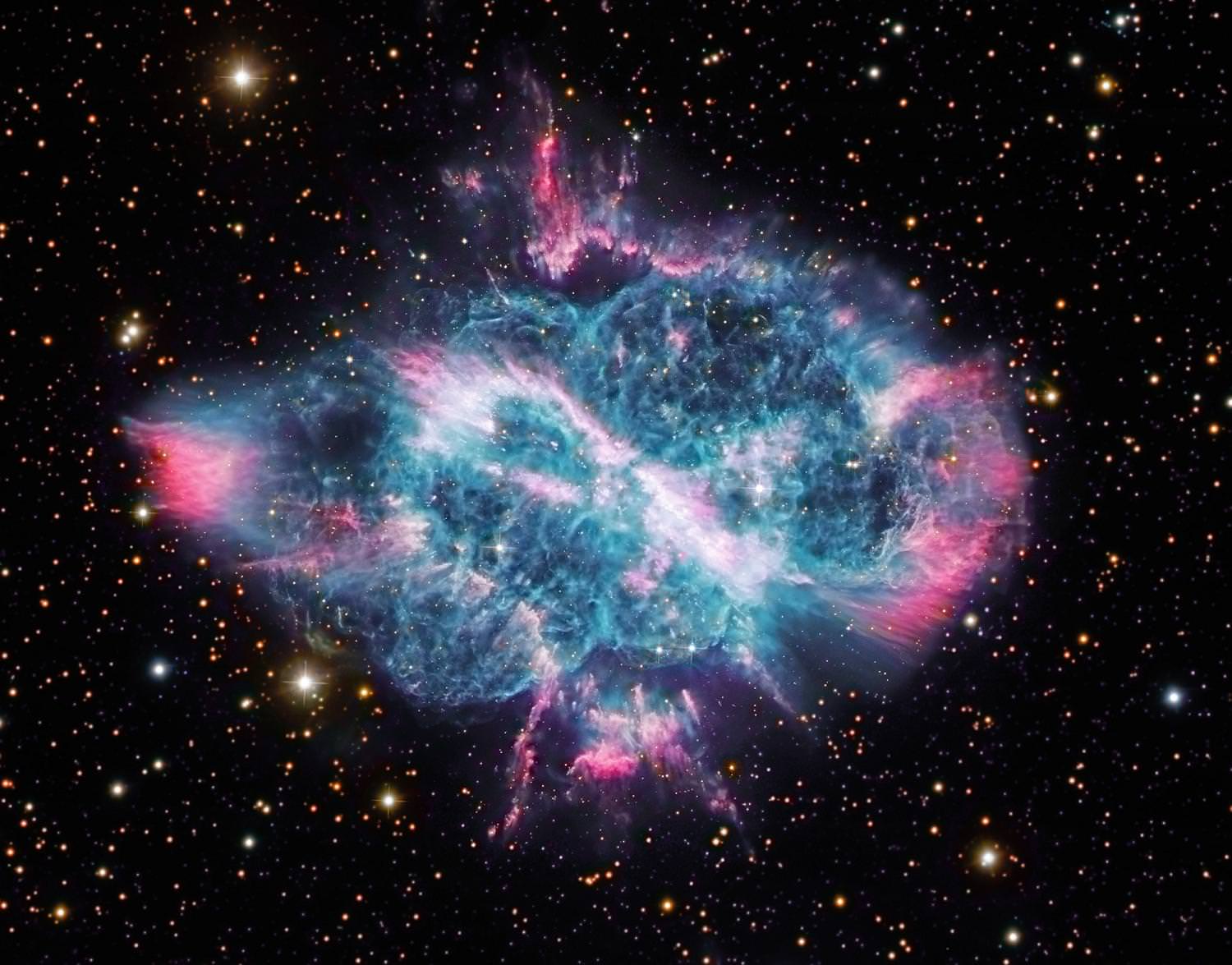
|
nasa.gov: "A nebula is a giant cloud of dust and gas ... Some nebulae [plural] come from the gas and dust thrown out by the explosion of a dying star... Other nebulae are regions where new stars are beginning to form."
universetoday.com: "Stretching across three light years ... about 3,000 light years away … [Nebula] NGC 5189 shows an extraordinary amount of loops and curls … gas clouds … [each] is about the same size as our Solar System… At the heart of NGC 5189 shines the tiny light of its central star… no bigger than Earth.”
|
E. And yet we also sense there’s something really substantive here. Let’s try again to go deeper into this subject of beauty.
K. We need to carefully unpack one of RT's striking statements.
consonance with the whole
The Good, I repeat, is beautiful not merely because of the good it does to us. There is something more to it. What is good is in consonance with creation as a whole and therefore also with the world of men. Whenever we see the Good and the True in perfect accord, the Beautiful stands revealed. (RT)
E. Earlier we began a discussion of “consonance with the whole.” We might find ourselves saying that aspects of the natural world are beautiful, like Nebula NGC 5189.
K. Or a bird on the wing, or an unfolding rose. How are these related to “consonance with the whole”?
E. It occurs to me that a conception of “the whole” is not the same for each person.
K. This is an important point.
E. When the author was a young boy, in his extended family were great-grandparents who had come to America from Europe 50 or 70 years earlier. Building a new life was very difficult, and most of the new arrivals, as Maslow used the term, would live on the "survival level” for a long time.
K. It often became a settled state of mind.
E. As the years passed, many of them became financially prosperous, but they continued to operate on the psychological level of penury.
K. And so, their vision of “the whole”, or the meaning of life and the universe, was one of threat and lack.
E. Here’s the really interesting thing. As the author vividly recalls, this group of now-elderly immigrants had great difficulty seeing the beauty in nature. There were exceptions, a few enlightened individuals here and there, but, as a culture and predominant group mindset, they would never say something like, “Isn’t that a beautiful sunset?” or “What a pretty bird!” Moreover, if someone did exclaim in this fashion there’d be a quick judgment of “You’re a crazy person!”
K. We shouldn’t be too surprised at this. If one is living on the survival level and, let’s say, with the need to work in sub-zero weather and with trouble finding fuel to heat one's dwelling, or if crops are ruined by drought or insects, then it’s perfectly understandable that one’s view of nature would take on a dire and ominous cast.
E. You wouldn't be too likely to say, “oh, look at the pretty snowflakes” when it’s 20 below and you have to feed the cattle and your hands and face are numb.
K. These pioneers are to be admired for their fortitude. Nevertheless, draconian environment produced a cautionary view of “the whole”, and, consequently, they could not readily see beauty in nature.
E. Let’s think about what this means.
K. It’s Anais Nin’s, "We don't see things as they are, we see them as we are."
E. The state of one's consciousness has direct bearing upon one's perception of "the whole."
K. We've called this a metaparadigm. It’s a cognitive framework, a belief-system, a cluster of assumptions. A metaparadigm is one’s master blueprint giving meaning to all that one sees and knows.
E. And if nature is judged to be harsh and demanding, then one might craft a vision of “the whole” as something forbidding.
K. When this happens, our relationship or "consonance with the whole" will suffer diminishment, and then we’ll tend not to see beauty in nature.
disinterested beauty
E. Recall our assessment that high-awareness beauty reveals itself only to those of non-utilitarian viewpoint.
K. If we’re worried about working in a freezing snowstorm to feed cattle, then nature’s elements will likely not be prompting us to gush, “oh, what pretty snowflakes.”
E. If the weather is threatening, then there’ll definitely be that aspect of utility as one views nature.
K. It’s hard to be detached and disinterested if you could be lost in a snowstorm.
E. As you would say, “oh, that little thing.” But let’s shift gears here and think about “consonance with the whole” for John and Mary and their perceptions of bodily beauty.
K. What does beauty and “the whole” mean on that level of thinking?
E. Well, here’s one idea. When I was a young boy, I remember being infatuated with two or three different girls. And the question is, why did I consider their beauty to be compelling?
K. There were other pretty girls around – me, for instance.
E. But later in life, as I was thinking about this formative incident, it suddenly hit me – they sort of looked like Shirley Temple!

K. Your “good ship lollypop” never came in, though.
E. It was clear to me that I'd been “imprinted upon” to see a little girl as pretty only if she looked like little miss “bright eyes.”
K. (sighing) Well, it is an interesting point. And a long time ago I read of some research concerning black males who predominantly sought for blonde white girls. Why? – because they wanted someone who looked like the prized Marilyn Monroe.
E. On the lowest level of sexual attraction, it seems that we are culturally conditioned to want a certain “image” in a partner. And when we find an approximation of it, we say that the person is “beautiful" - which just means "It's what I like, it's what I know, and so I want it."
K. The fact of the matter, as Krishnamurti pointed out, is that people can be conditioned to believe anything, or to judge anything as good or "beautiful." Consider this third-world woman for whom a large object in mouth is deemed de rigueur.

E. This one example tells us that definitions of beauty, like morality, become a function of geography, where you grew up.
|
K. Elenchus, this is really something. If our notions of the good and the beautiful represent a cultural conditioning, then – we don’t know what we really like.
E. That’s what Maslow said, if we're swimming in repression, we don’t know what our true preferences are.
K. I can now see that, as we grow as a person, as the “true self” gains the ascendency in one’s life, we find out what’s deep inside, what we really want. And it may be quite different from what we always thought we wanted.
E. And at the top of that list of “things to realize about myself” is "who do I want as my one-and-only"?
K. You thought it was Shirley Temple.
E. But, when my “good ship lollypop” came in, you were on it.
K. (small smile)
E. It’s all very counter-intuitive. A boy can be socially conditioned to want a girl who fits the Shirley Temple image. And he might even get her, but when he does, if an image is all that’s undergirding, he will feel the “emptiness” inside, an existential malaise, and will quickly grow to disdain her.
K. But it’s all different for Twins. The destined mate is likely “something never seen before,” meaning, there’s no image to foreshadow. He doesn’t know he wants her, it's his soul's choice, there’s no conditioning for her. And when he meets her, he might be confused as to why there’s an undefined magnetism. At the surface, at first, he might not want her, but if he tries to ignore or put her away, his soul will make him pay hell for this.
|
|
the conditioned good person, the conditioned perception of romantic love
K. I think we should talk a little more about this concept of being conditioned to want Shirley Temple. The underlying principle has far-reaching implications.
E. When Krishnamurti said that we can be conditioned to believe anything, and want anything, we often associate this conditioning with some form of negativity. We think of the terrorists who were conditioned since childhood to hate another nationality.
K. Or those of a particular religion being conditioned to hate or shun those of other religions.
E. We could make a long list. In fact, if we are very honest, pretty much everything we like, or think we like, is the result of some form of mental conditioning.
K. I hate the idea of eating raw fish – the result of not growing up in Japan.
E. The examples are endless. But, what about conditioning in terms of what we call “the good person.” This is someone who had a fairly good parental home environment.
K. Was not allowed to step out of line too far, or you’d hear about it.
E. And so this person grows up, has certain somewhat-high standards built into him or her.
K. We already feel the "external" management. And now they think they’re a “good person” – better than those “on the other side of the tracks.” What's really guiding them is the memory of mom's voice still scolding to shape up.
E. You know, Kriss, the lower levels of Summerland are filled with this kind of “good person.” We talked about this in “the 500 tape-recorded messages” writing.
K. These people on the streets of Summerland will smile at you, would help you if you needed something, but they’re psychologically off-base, with a certain “brittleness” of spirit, a shallowness.
the conditioned can be un-conditioned
E. We can see that it’s not enough to be a conditioned “good person.” Because anything that exists as a result of conditioning can be “un-conditioned.”
K. With enough pressure, these “good people” will crack and fall apart. And so, Elenchus, how would describe the remedy?
E. Our goodness needs to be built upon one's linkage to God, to Universal Consciousness, not the ego’s self-congratulatory chatter of “I am better.”
K. This is an extremely important point of understanding. The spiritually mature person is not a glassy-eyed Pollyanna, smiling all the time, thinking herself to be "above.".
E. As Art Mokarow always said, if you’re smiling all the time, there’s something wrong with you.
K. True spirituality is built upon, not just the true self but, a clear perception of one’s dark side, the domain of the ego and the false self.
E. But let’s add an extra word, too, about the conditioned romantic love.
K. The conditioned love for Shirley Temple.

E. We cannot hope to find the eternal mate, nor enter the eternal love and marriage, defeating the "terror of living forever," on the basis of conditioned romantic attraction. We have to go deeper. One’s love for the true mate has to be built upon the “energy waves” of the soul, one’s resonance with the true mate’s inner life.
|
K. Another example of ascribing goodness to an object of desire, we might say “that ice-cream looks really good".
E. But, after the fourth helping, it doesn’t look quite as good. And notice here, too, that "good" is often used as a synonym for "beautiful." It's what we like and what we want.
K. What would this mean in terms of “consonance with the whole”? It seems that in all these provincial opinions, one's conception of “the whole” narrows to something short-lived, designed to satisfy peers or animal hungers.
E. “The whole” in these cases – from John-and-Mary sexual attraction, to ice-cream desserts, and other temptations – represents a stultifying mental edifice of ephemeral stimulation.
K. And so none of it can satisfy on a lasting basis. All things of the body pass away; and, for John, his desire for even the most beautiful woman begins to cloy after the honeymoon. Soon it's not enough anymore.
E. Krishnamurti had a lot to say about this subject. He spoke of mental “images” created by the ego; that, people don’t authentically relate to the other’s true person but only with images about the other. We do this, he said, to allow the ego to protect itself from competition or threat, or to self-enhance oneself by believing that the “image” will “make me happy.” We do this not only with people, but we create images of reality itself.
K. The survival-level pioneer might create an image of reality as something ominous and dangerous; and a young boy could create an image of the ideal girl as similitude of Shirley Temple; his best chance, he thinks, to find happiness.
E. In all of these examples and many more we enter into relationship, not with the actual person, not with the universe as it is, but with an ego-created image. These images define “the whole”, as the ego sees it. And if the ego has opportunity to actually gain the object of its fantasies, then it will judge, temporarily, the sought-for trophy as something “beautiful.” In this euphoric receiving, the ego builds a diminished version of “consonance with the whole.”
K. Let’s talk about all this now on a grander stage of life – the coming together of Twin Souls. You and I keep going back to the moment we “first met”.
E. When we realized who we are to each other.
K. And as you’ve described your mystical perceptions, you’ve often said you felt very disoriented, but not in an ordinary bio-attraction way.
E. It was beyond that.
K. I’m thinking that your definition of “the whole”, in just several minutes, underwent radical transformation. All of those culturally-determined definitions of what the “right girl” ought to have were suddenly jettisoned in favor of a soul-based orientation.
E. During all those years before I “met you,” my relationship with you – if you can call it that – was actually with an ego-image of you. I’d never met the real you. But then, in one cosmic moment of clarity, old images shattered, and I suddenly “saw” the real you.
K. And what does this mean in terms of “the whole”?
E. In just minutes, my entire metaparadigm was replaced. And though it would take several years to really understand, I’d been given a new vista of the future, sacred destiny, and divine purpose. The rational part of my brain virtually shut down during that experience as it was so overcharged, but the intuitive side of me could see clearly.
K. When lovers enter this new state of seeing each other authentically, not only does their definition of “the whole” alter radically, but ensuing judgments of “beauty” morph into “something never seen before,” as “The Wedding Song” puts it.
E. It’s a perception of beauty – of purest grade – as “consonance with the whole,” and this whole is nothing less than God’s eternal purpose and plan for each of us; all represented by the radiant visage of one girl.
|
K. We can help ourselves define beauty with a reminder that, when the "false self" is involved, it will always be about “I don’t have enough” because “I am not enough.”
E. Yes, excellent insight, Kriss. In the unenlightened state, whatever we want, we say it’s “good” and “beautiful”, and this is our judgment of it. But these words merely express the cravings of the dysfunctional ego.
K. It’s quite clear to me now that we have to move up the ladder of better awareness to enter perceptions of higher-order beauty. The ego can't be involved as it will just gum up the works.
|
goodness and truth, in perfect accord, are revealed in what we call beauty
The Good, I repeat, is beautiful not merely because of the good it does to us. There is something more to it. What is good is in consonance with creation as a whole and therefore also with the world of men. Whenever we see the Good and the True in perfect accord, the Beautiful stands revealed. (RT)
K. With our last statements, our readers might assume that we’ve said about all we can concerning RT’s paragraph. Strangely, even to me, the best is yet to come.
E. There’s another important insight to be gleaned from his three sentences.
K. We’ve spoken of “consonance with the whole.” But let's look closer. Beauty is a kind of child of goodness and truth.
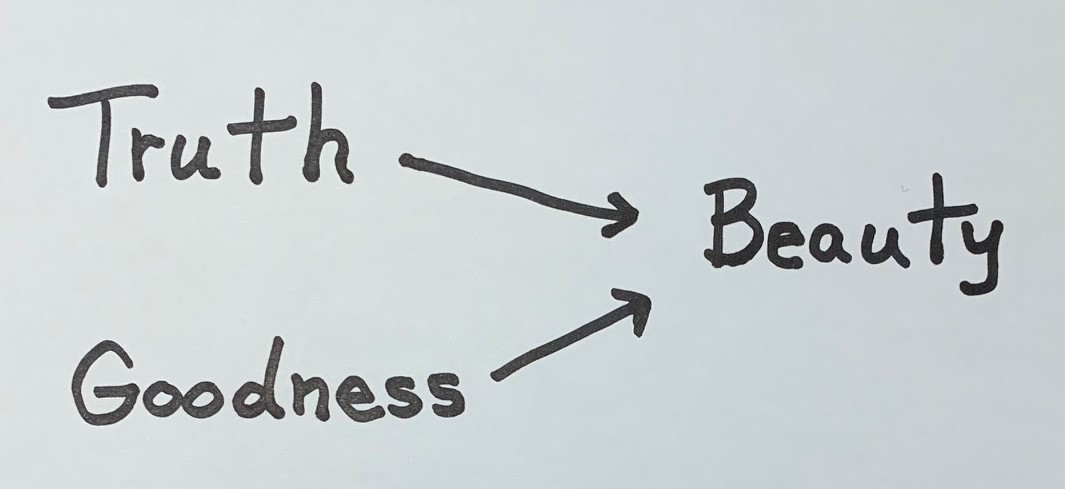
K. A long time ago, when we were learning of these things from Mortimer Adler, he said that beauty is not so much a stand-alone entity but is related to both goodness and truth... (sighing)
E. You are pausing?
K. Elenchus, I guess I'm feeling very overwhelmed. On the “Beauty” page we have several articles which discuss bits-and-pieces of what must serve as background to this discussion. But we can’t reproduce all that here. Instead, I must strongly encourage our readers to review the articles there, especially “Beauty: 1-Minute, Part III.”
E. With this in mind, shall we at least offer a brief summary of what needs to be understood as preliminary information?
K. Beauty is a child of goodness and truth. But, it’s complicated by the fact that, in the unenlightened state, people disagree on what goodness and truth are.
E. And therefore their judgments concerning beauty will also be all over the map.
K. What a person calls “beautiful” is really an expression of his or her underlying definitions of goodness and truth.
E. Even this much is a great principle for everyone to know.
K. Beauty is like goodness in certain respects, and partly like truth - but see the full discussion in the antecedent writings. We judge something as "good", in the best sense, when it's aligned with "the whole"; and, in this alignment, we call this perception of the consonant good "beautiful."
E. And truth?
K. In like manner, something is "true" in the best sense when it's aligned with "the whole"; and, when it is aligned, we call this perception of the consonant truth "beautiful."
E. The "beautiful" reflects our discovery of goodness and truth.
K. There are graded or approximated versions of this discovery, but, as RT points out, "Whenever we see the Good and the True in perfect accord, the Beautiful stands revealed."
E. The Good and the True, perfectly aligned, give rise to our highest realizations of the Beautiful.
K. And, you know what? I think this is why the "first meeting" of Twins is so explosively wondrous. They represent, in microcosm, Mother-Father God, and you can't get closer to "perfect accord," a modeling of Goodness and Truth, Ultimate Reality, than that.
E. And with this realization, there's no greater perception of the Beautiful.
|
Omraam Mikhael Aivanhov:
“The soul ... is itself only one-half of a complete being. For each of us there is a counterpartal [person] of the opposite polarity. And our pilgrimage towards emancipation [from illusion] consists in drawing ever nearer to this balancing factor ... so that, in the end, [while retaining sacred individuality,] we become [effectively One Person,] a male-female being in whom the positive and negative forces are in perfect equilibrium, reflecting the nature of the Male-Female Creator. Only through the perfect union of two souls of the opposite sex can that blending of forces be achieved which brings freedom from illusion and the full experience of Reality.”
|
|
beauty is not in the thing
Jiddu Krishnamurti, September 24, 1967, London: “Like love, beauty is not the cultivation of thought. A thing of beauty is not beauty. Beauty is not in the thing, in the building, in the person; but there is that beauty which is not the result of conditioning, in which thought in no way interferes.”
The sense of beauty is an opinion, a judgment, concerning the good and the true.
Beauty issues not from one's “hardware” but “software,” the “programming.”

See more discussion in the “waves” article.
|
|
K. Beauty is one of the great ideas of history, and here’s another aspect we should talk about. “Beauty is not in the thing.”
E. Every guy in love is convinced that she is the source of beauty.
K. She won’t go out of her way to clarify, but there’s more to it.
E. The sense of “beauty” can reflect base passions or the exalted “consonance with the whole,” but, either way, beauty is really a kind of editorial statement by one’s person.
K. Yes, that’s right. When we offer the judgment of “beautiful,” we really mean to say, “this satisfies my cravings” or “this feels so right, I know it’s part of God’s plan for me.”
E. Sheldrake asked, “why is there so much beauty in the world?” But not everyone sees it.
K. The pioneers struggling for survival won’t see it in the snowstorm, and those who think only of money and possessions won’t “smell the roses.” So, we have to be of a certain frame of mind to see beauty in the world – or, to be ready to see it in one’s destined mate.
E. It’s a really interesting concept – “beauty is not in the thing.”
K. Two people can look at the same object – one sees beauty, the other sees a disturbance to his day.
E. And so she said, “do you believe in beauty at first sight? – or do I have to walk by you twice?”
K. (softly laughing)
|
postscript
E. You remember our discussion of the meaning of "lila." I said it was more than "playfulness." And I think our present insights take us closer, that a perception of beauty is a way of expressing a kind of punctuated joy or thrill in discovering the good and the true.
K. And so, when God sees Beauty, it's "lila," a form of joy to know the essence of goodness and truth.
E. I think this gives us a crisper meaning. Therefore, "lila", we might say, is a burst of delight, an exultation, to know truth and goodness.
K. This makes me think of something. It sounds like a definition of humor. In an earlier discussion we said that “getting a punch-line” is an aspect of delighting in the truth. And with this linkage to humor, maybe we can see that “lila” is associated, yes, with “playfulness” but also a delight of sudden insight, a form of the perception of something true and good.
another thought on 'consonance'
K. Romantic love is so mysterious. We keep peeling away layers of the onion, but we never reach a terminal level. The mystery just keeps expanding.
E. Many times I find myself trying to define what I like most about having you near.
K. Like trying to describe that shapeless nebula?

E. Sometimes I see you just from a perspective of bodily “poetry in motion,” and you’re not deficient in that area. But, then I perceive that physical allure is not the driving factor.
K. Of course, we’ve talked about this on a thousand pages. The thrill of beautiful bodies, if that’s all you have, has never kept any couple happy for very long.
E. There’s a part of me – and I don’t have to “go within” so deeply to find it – that is well aware of this potential existential crisis; as you said, if that’s all you have.
K. So, tell me, what is it that you have?
E. That’s the uncharted nebula, isn’t it. But when I quiet my mind, I see it’s much more than erotic enticement. Jim Croce’s Time In A Bottle spoke to this: “I’ve been around enough to know that you’re the one I want to go through time with.”

K. And the “been around” extends beyond traveling the world searching for pretty faces. The real investigation is internal, mapping the particular desires of one’s own “true self.”
E. That’s the heart of it; and this will allow one to recognize the true mate when she crosses the radar screen.
K. (softly) And what does it really mean to “want to go through time with” one particular person?
E. I can feel the answer deep within. And it has little to do with fascinations of the body; although, that’s part of the package.
K. (small smile) The factory-installed sports package. But, Elenchus, in the first part of our present discussion we offered some things that can help us clarify a desire to "go through time" with a certain one:
|
E. When we "first met" I'll always remember how effusively excited you were. I called it your "extreme delight." I'd never seen you like this, and I couldn't get over how different you were.
K. I believe that... when we finally encounter the real love, an entirely new vista of a wonderful future opens to us.
E. That's the "consonance with the whole".
K. And the ensuing sense of elation unlocks a long-barred door of the soul, allowing one's true self, now more confident, to emerge, to blossom, as never before.
E. I was astonished, and mesmerized, at the beauty of your authentic self; but then (sighing), I'd never "met" you before. I'd never seen you like this.
K. In receipt of all these good things, we glimpse ultimate harmony and unity -- this flash-image of the "beauty" of sacred romantic togetherness -- and it's so overwhelming that no other pleasure in life can compare to it.
E. And this is why I used the phrase "most erotic moments of my life" though we didn't even touch hands.
K. And so I think "extreme delight" well captures the sense of one's euphoria.
E. It feels so incredibly good, not just to have found one's eternal mate -- which is devastating enough -- but also to see oneself as fitting in with God's plan and destiny for us.
K. Truly this is "consonance with the whole."
|
K. Let's see if we can say more about this "consonance."
E. An image is coming to mind about us. It's like floating on a serene waterway...

... gliding down a river of endless time, with all of the activities to come, all of the love to be shared, all of the knowledge to be gained, the personal growth and expansion, all sorts of far-country explorations, travel, and discoveries in the universe – to glimpse all that in a hot moment, but then, to recoil, and to admit - to myself - “I wouldn't be able to do that, I wouldn’t have the full motivation, I’d soon be consumed by a haunting emptiness – unless one particular girl agreed to go through time with me.”
K. (silence)
E. But even this is not exactly what I want to say. It's not that I need a travel partner to better enjoy the thrills of eternal life - no! I'd want to be with you even if there were no excursions and side-trips. The truth is... I just want you. And... I can't really explain why.
K. (softly) Why don't you use the same convincing argument that I recently used -- "I just do."
E. (deeply sighing) Yes... that's it, exactly... I just do.
K. Dearest Elenchus, I think our mutual soliloquies of 100% fealty, 100% devotedness, each for the other, are most meaningful to me among all that we’ve said about love.
E. I always recall, and am always moved, by what you expressed in the “Georgia Girl, Georgia Boy” writing. I love that so much.
K. And your metaphor of sailing the vast ocean of time, navigating a plenitude of lovers' blessings; but, even more, realizing the sufficiency of what we are to each other -- that I, in my own person, am "enough" for you -- all this, along with finding our place in God's purpose, helps us define what we’ve called “the whole.”
E. And concerning one's relationship to "the whole," with the coming of that one special person whom the soul recognizes as “darling companion”, one finds mind and heart flooded with a staggering and inundating sense of “consonance.”
K. Elenchus, can you give us one more quick definition of "consonance with the whole"?
E. I would say, it just means one's sense of connectedness, of feeling oneself to be in harmony with, ultimate reality, which is the mind of God.
K. And for those who might be apprehensive that this marvel might slip past them in the night undetected, don't worry, you can't miss it, it's not like some legal-fiction of "blessing" at church where you feel nothing; no, this will rock your world, turn you inside out, and up-end your well-ordered life.
E. Newcomers will doubt us on this, but they'll find out. When you perceive "who's who", that "true one" just for you, you'll know it, way down deep - you might forget your own name, but you'll know that.
K. As a final word for the benefit of those who would still ask "How will I recognize my eternal mate?", all we can say is, sacred "consonance" is the Geiger counter you'll need to identify.
E. And how do you get this Geiger counter? - well, it's actually deep within, you already have it, but most people haven't found the "on switch".
K. But, be careful what you wish for. As Carl Sagan used to say, "Do you wanna go for a ride?"
|
E. “Consonance with the whole” is a powerful concept but it needs to be made clear. Here’s another aspect of what it means to me. You remember our talk about a future “10 acres secret-garden hideaway.”
K. It’s never very far from my most treasured visions of what’s to come.
E. And sometimes I have this little thought-experiment. I try to imagine, would I want to live in that private reserve with another pretty face? And I’m always somewhat jarred by the answer. No matter how attractive the imagined girl might be, or intelligent or talented, I always end up feeling flat and empty if I picture myself living there with someone else. It just doesn’t work.
K. We get the same internal reaction if we try to envision ourselves taking university courses with another, or going to parties hosted by close relatives, or serving the disadvantaged, or raising children. I just wouldn't want to do these things with another person.
E. No matter what the activity is, if I try to see myself doing any of those things, I quickly sink into feelings of emptiness. And this is rather amazing, because a substitute for you would have to be one of these “perfect girls.”
K. Perfect, but not for you.
E. And I run this thought-experiment in my head from time to time just to see if I get the same answer. And it’s always the same, and it’s rather shocking. To an outside observer, there would be no discernible qualitative difference between you or an alternate “perfect girl.” And yet the end result is light-years different.
K. Elenchus, clearly we’re dealing here with an invisible non-material element. Something that doesn’t show up on a resume or an e-harmony compatibility quiz.
E. This is so obvious to me now. And our new concept of “consonance with the whole” goes a long way to make this clear. It’s now very plain to me that each Twin mate, each for the other, offers either a microcosm of destiny, or a portal to it.
K. In other words, each Twin presents a picture of or epitomizes “the whole.”
E. In the presence of one’s Twin mate, or even contemplating her, we feel ourselves drawn toward or linked to God’s plan and purpose for us.
K. And this is another way of saying “consonance with the whole.”
E. And this is why it would never fly with my deeper self for me to try to live with another on “the 10 acres,” or to take her to see my grandmothers, or to study all those things at university.
K. Because it’s more than those activities of and by themselves, you can't just do these things with any person and feel the same, there's more going on here. It’s what the activities represent, and they represent all good things that reflect our desire for oneness, our hidden soul-bond, our “made in the image” uniqueness before God.
E. There’s only one person, for each of us, who’s in tune with all this, in “consonance” with it.
K. Though we’ve said it in several different ways, one’s true mate is attractive to us for reasons extending well beyond common girl-boy dynamics.
|
E. Can we summarize what we’ve said about “consonance with the whole”?
K. There’s so much, Elenchus, it almost seems foolish to try. And yet my heart bursts to know this subject, and so I can feel there's something more I want to say.
E. I don’t think we ever gave a definition of the word “consonance.”
K. Thank you – “consonance” literally means “to sound together” or “sounds in harmony.” And this is what we feel in the presence of the true mate, a deep resonance or a matching harmonic vibration. It just feels really right.
a blending or sense of matching, a oneness
E. We can appreciate the attractiveness of another, but in the midst of, what Adler calls, “enjoyable beauty,” one's deeper person might be flashing a warning, “this doesn’t feel right, this person doesn’t belong to me.” There’s no sense of “consonance”, neither “with the whole” nor with one’s true self.
K. In fact, it's "dissonance." And what you just said is one of the greatest life lessons. And I now know what I want to say in summary. Think back to our discussion on the many “sweet phrases” from the world’s greatest love songs. How easy it is to be taken under, go swooning, and lose one's mind with images of “angel baby”, “this magic moment,” and so many more. It’s virtually like having too much to drink, the intoxication, the romantic euphoria, is so debilitating. However, if we had our wits about us during those times of “sexual inebriation,” we might perceive, on a deeper level, “there is no consonance with the whole here.”
E. And yet, despite the power of these deeply moving romantic phrases and images, it's not enough. Young teens, and most adults, well “under the influence” of “Aphrodite’s madness,” have not yet figured this out.
K. Most do not understand that “consonance with the whole” not only represents a higher, even more potent, form of sexual attraction, but, when it comes, it does so in a manner that does not shut down one’s critical-thinking faculties. In fact, consciousness is elevated.
E. This has to be experienced to truly grasp.
K. And here’s another strangely related concept. When we meet that true one, made just for us, he might come into one’s life without overtones of “angel baby” or "this magic moment." This will come later, but, at first assessment, he might annoy you. You might not appreciate him so much right off the bat.
E. This sounds strange and can confuse us, however - to be blunt, it's quite possible not to like somebody but, at the same time, to feel the "inner harmony".

K. (sighing) It's an awkward posture.
E. And it's also very confusing to really like someone, and really want to be with them, but, despite this surface attraction, to sense no deep "consonance."
K. The disparity can be so great, with the "outer" attraction so strong, that most people will say to themselves, "the deeper love will come later." And then they join the desperate and disillusioned ranks of Ann Landers' "miserably married."
considerable difference between lovin' and likin'
|
Kairissi. “Shenandoah” was a very popular film in 1965.
Elenchus. What do you think of it?
K. There’s one segment that’s become somewhat well-known for its advice to newlyweds.
E. The “do you like her” scene.
K. They're saying what we say, but they use different terms. When they say "love" they mean "surface attraction" and "like" means "inner consonance". But here’s the dialogue:

Charlie Anderson: Why do you want to marry her?
Lt. Sam: Well, I love her, Mr. Anderson.
Charlie Anderson: Well, that’s not good enough, Sam.
Lt. Sam: I beg your pardon, sir?
Charlie Anderson: Do you like her?
Lt. Sam: Well, I just said I…
Charlie Anderson: No, no, you said you loved her. There’s some considerable difference between lovin’ and likin’…
contempt comes up with the sun
You see, Sam, when you love a woman without likin’ her, the night can be long and cold, and contempt comes up with the sun.

|
K. (sighing) "Contempt comes up with the sun".
E. In any case, if the "consonance" is in place, the normal romantic feelings of “angel baby” will come soon, or at the right time, and when they do they'll be permanent:
K. No "nasty habit of disappearing overnight." It's permanent because the "inner harmony" from mutual soul-energies never goes off line. This is the basis of poets' idyllic vision, "love that lasts forever."
E. All this is more important than most people realize. When we live in Summerland, essentially everyone will look twenty-something with a perfect and beautiful body, men and women.
K. And so, for the uninitiated, those who are blind to the “inner consonance,” one could fall in love ten times a day with each passing beautiful guy on the street.
E. It could be a real hazard. I was thinking of this when I read ITC researcher Mark Macy’s report on Anne de Guigné who heads “the Group to Protect Newborn Life” over there. This spirit-girl is not only virtuous but quite attractive.
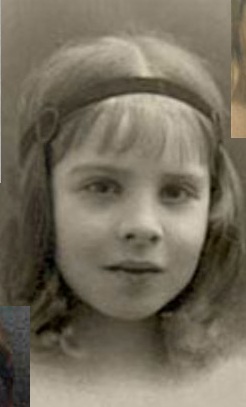
K. I have to agree. She looks angelic. I suppose she is. And a girl's first reaction is, how do you compete with a perfect dream like this?
E. Actually, she reminds me of you. I guess that’s why I think she’s pretty cool. But, for those authentically linked at the soul level, there's never any competition. This is not possible - not when one has experienced the "consonance with the whole."
K. John and Mary know nothing of this immunity to competition.
E. Even in the midst of an acknowledgement of another's beauty, there is an immediate deeper sense of things flashing a message, “she doesn’t belong to you.” This means that she's not a real temptation. The reality of one's true mate and what she is to you is too strong.
K. (sighing) It’s very clear that our internal guidance system of “inner consonance” is a real life saver and will keep us from great suffering.
E. At the surface-level of personality, we're not able to wisely choose a romantic Twin partner - because it's your soul's choice. We can't just decide to make any pretty face an eternal mate by "working on the relationship." One either has this sense of "consonance" with another or does not; if it exists, it will be there unendingly, and if it's not there, it will never be there.
K. Your true mate is God's choice for you, this cannot be changed and was decreed, right from the "soul nursery."
Kahlil Gibran: "It is wrong to think that love comes from long companionship and persevering courtship. Love is the offspring of spiritual affinity and unless that affinity is created in a moment, it will not be created for years or even generations."
|
once again, one more time, just like that, again
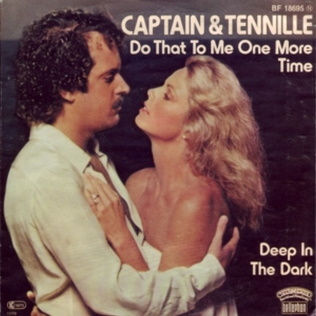
Do That To Me One More Time
| oh, kiss me like you just did, do that to me once again, oh, tell it to me one more time, say those words again like you just did, tell it to me once again |
Editor’s note: In a featurette on the “holodeck” page, Kairissi and Elenchus discussed the Kama Sutra principle of each lover receiving, each from the other, exactly what she or he desires during sexual encounter. Captain and Tennille’s “Do That To Me One More Time” highlights this made-to-order, personally defined, version of sex. See more in that writing. At its close, Elenchus shared that he’d recently seen something new concerning an element of romantic dynamic superseding the Kama Sutra tenet. He said it’s embodied in “touching foreheads.”

|
Elenchus. I believe that I’ve been given greater clarity on what lovers really crave. It’s one of those “sparks” of private tutoring, an instant “knowing” but very difficult to share with others.
Kairissi. All “sparks” are sent exclusively to one person, marked “for your eyes only,” but try to explain, Elenchus.
E. In the “Captain and Tennille” writing, we spoke of the Kama Sutra principle of unique definitions of sexual happiness.
K. Each lover communicating exactly what he or she wants.
E. And the Kama Sutra suggests that, if implemented, romance might last “a hundred years.” But this is probably an exaggeration.
K. Even though each romantic mate might receive made-to-order sex.
E. It’s not enough. Anything physical is never enough. There’s a spiritual, non-physical part of us that requires more, more than physical bodies in nexus.
K. The physical bodies in nexus is just an outward symbol of an inner craving for deeper oneness.
E. Yes. And I’ve seen something new. Well, it won’t sound so new when I say it, but I actually “saw” what’s needed, and this was new, at least for me.
K. Mere words cannot take us to where we want to go. We can talk about wonders but unless we actually “travel” to this marvel, it remains theory. So, tell me Elenchus, what did you “see”?
E. I saw that there’s a reason why we’ve said touching foreheads can feel like the most erotic of sexual experiences.
K. Elenchus, I must apologize to interrupt, but I’m getting a “spark” of my own just now. As we’ve said, physical sex, bodies in union, represents the more lofty “One Person” status, but I’m seeing that “touching foreheads” is also a representation of this spiritual oneness, and, I will venture, an even higher grade. I think this is so because “touching foreheads” is more than a union of bodies but a “union of spirits.”
E. Very good, Kriss, and maybe you’re seeing more clearly than I.
K. Even kissing is a desire to represent oneness.

K. But continue, Ellus.
E. It’s just that, in my flash vision, I saw why, in the beginning, Twins might not like each other...
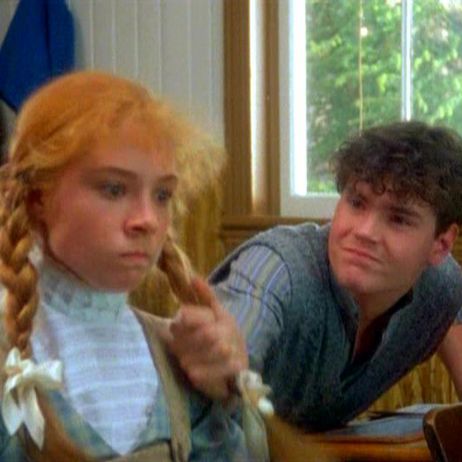
E. ... and yet, they are drawn to each other at a deeper level. Like the Sun’s brilliance cloaking the many other stars, the internal “consonance” of soul-energies singing in harmony blocks out what egos may or may not like.
K. And “touching foreheads” is a symbol of this internal resonance. And laughing together, too, maybe especially, well expresses this deeper joy of oneness - and you know what, I just love this photo so much, it's just what I like so much.

E. I know... it's so you, who you are. And if I had to give one reason why I love you, it's because of this aspect of you, right here - perky and playful.
K. And it's strange, Elenchus, although everyone knows this - you can experience the garden-variety sex, often a mechanical ritual, and never come within a North Dakota country mile of this kind of joyful happiness.
E. (sighing) And let me say, as well, to state the obvious, you can’t just put any two random people together, have them touch foreheads, and expect to experience this.
K. The internal resonance comes first. The touching of foreheads, authentically in play, is simply an outward expression of a deep inner affinity.
E. I said that what I saw had to do with why Twins might not like each other at first. But this is not the main part of my "vision." It was much more. What I saw was, lovers want to touch foreheads because, what they really want, or want to display or represent, is that deeper connection.
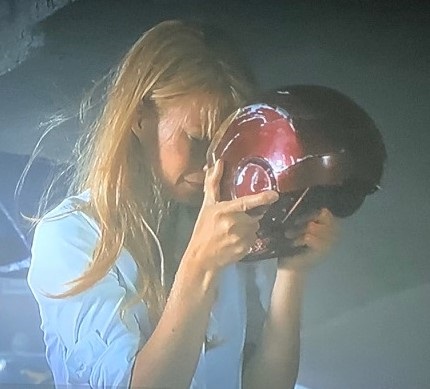
K. That's the real gold and the truest eroticism.
E. It is, but I'm not making myself clear. It's really hard to convey... I had this vision of us lying down together, embracing, touching foreheads, and... what I felt was... what we really wanted was to magnify, to focus on, or to make real, our inner sense of soul harmony... the mutual "consonance" of deeper energies... this was very clear to me, and we wanted to completely immerse ourselves in that sweet confluence of sacred essence, each for the other.
K. (sighing)
E. Yes, I know, this doesn't really tell you much... I told you I couldn't explain.
K. (softly) It's ok, Elenchus... remember, too, that I'm the other part of this equation, and I, too, have experienced these things with you.
E. Kriss... what do you think, what does all this mean?
K. (softly) I think it means that our most cherished and sought-for experience of sexual union is not primarily rooted in the body, but... in those mutually-answering soul energies... We have experienced this... and it's something counter-intuitive to general views of sex. But we have seen the promised land on this and know there's far more coming than just bodies in contact - even though we wouldn't want to give that up.
E. (sighing) Yes... and, you know... you're better at explaining these things than I am.
K. (softly) (smiling) There's a reason why I was first in coming to you.
E. (smiling)
K. And Elenchus, this is why you said, when you first “met” me, that those were “the most erotic moments” of your life. You had suddenly, inadvertently, activated our eternal soul connection, and the sense of oneness flew off the charts for you and was expressed as intense sexual intimacy.
|
|
|
authentic relationship as intense magnetism
Editor’s note: The following paragraph I’d like to dedicate to a very old friend. His name was David. When I was seven, our farmhouse was being moved onto a new foundation. Surrounding the construction were very large piles of dirt from the excavations for a new basement.

One evening, a farm-family visited our house. I didn’t know them, and I’d never met their son David, two or three years older. It was unusual, we two immediately hit it off. I felt him to be a “best buddy.” For a few hours that July evening, while the parents seemed to have been talking business, David and I played “king of the mountain” on those giant dirt piles, threw clay clods at each other, and just laughed and laughed. It was one of the best times, and I’d never met him before.
friendship as sacrament
There was something about him that really meshed with me. But our good time ended, the family drove out of our farmyard, and I never saw David again. Because he was a little older, I think what happened was we grew up in different orbits, and so our paths failed to cross. Even so, part of me never forgot that fun time we had.
My next memory of David, fast forward, I can see it in my mind now, I’m an older teen and my mother is informing me that David has been killed in Viet Nam. I was taken aback but displayed little emotion. Today, 55 years after the fact, as I recount that event of elegiac news, I find myself weeping. But maybe someone else also weeps for me.
Two years ago, I was thinking about David. I remembered his first name but never knew his family name. And I wondered about how I could find out more information. Shortly after this unspoken request, I was looking through an old book about the home-village, a commemorative work featuring a few paragraphs on all the families from the vicinity. I hadn’t looked at this book in many years, and my purpose was not to find information about David, as I didn’t know his last name. My intent was to read about a jovial old neighbor, a Mrs. A.K.
In somewhat recent years, I'd visited her, though now passed on. She brought out an old photo album and told me a very funny story. On their old farm, a lifetime ago, they’d used dynamite to dislodge a rock in the farmyard. It seemed to be a small rock, just nuisance value, jutting from the ground. However, as they dug around the rock, said rock-in-question turned out to be much larger than they’d suspected. And when the explosive sent the fully revealed, now disgorged, boulder flying, it was discovered to be almost as large as their farmhouse! – their own dwelling narrowly escaped leveling by the unruly small mountain. She had photos, they're posing by the megalith, like a fisherman displaying a big catch, the formidable boulder now positioned smartly just next to the house. It was a close call. Well, we laughed a lot about that.
But in my searchings through the village-history book for Mrs. A.K., by “chance”, among hundreds of family histories, my eyes happened to light upon a reference to David. Immediately, I could tell that something was up, and knew that he had "pulled some strings" to arrange for me to find him in the only source in my possession.
In her books, Lilian Whiting recounts how a departed close friend, through as series of seemingly fortuitous events, managed to make contact with her. Analyzing the marvel, Whiting came to a better understanding of authentic relationship.
From Lilian Whiting's “The World Beautiful” (1898), in a chapter entitled “Friendship As Sacrament”:
Friendship in its best sense is the Divine part of life, and the communion with the angelic is best learned by the communion of spirits, - for the human being is, primarily as well as potentially, the spiritual being even in this part of life. So divine an experience as friendship should be divinely lived.
It is a sacrament, and should be held in living faith and perpetual sweetness of spirit. Friendship should be held amenable to an appreciation of high qualities… The term is, indeed, a larger one than that restricted to the mutual relation of companionship, although the latter is the perfection, the very inflorescence, of friendship.
The perfect companionship is the most exceptional of joys, and a joy so dependent on temperamental relation and on conditions that are, so to speak, prearranged, that it can never be made a matter of will or of conscious choice.
Our companionships are our magnetisms. The friend whose appearance never interrupts but always inspires; with whom one would always choose to share music, painting, poetry, the drama; in whose companionship the delights of travel are doubled; the friend whose presence is always harmonious and infinitely dear, — is one with whom mutual relations are determined by something higher than the conscious choice of the moment.
To have all friendly feeling and good-will toward another does not in the least presuppose this magnetic relation of companionship. That must establish itself, or it can never be established. It cannot be demanded as a right or entreated as a favor...
The sympathetic magnetism that springs spontaneously between two persons cannot be made or unmade by conscious choice. It is the mutual recognition of the higher selves of each. Such a relation endures, though it be not supported by outward intimacy…
Some subtle and intimate communion of spirit, irrespective of outward meeting, keeps true friendship alive. Does not this fact tend to confirm the theory that we live largely, here and now, the life of the spirit to a degree not always registered by the lower consciousness?

E. Earlier, I'd been groping for words to explain the potency of touching foreheads and why it means so much. I said that:
what we really wanted was to magnify, to focus on, or to make real, our inner sense of soul harmony... the mutual "consonance" of deeper energies... this was very clear to me, and we wanted to completely immerse ourselves in that sweet confluence of sacred essence, each for the other.
K. I think Lilian Whiting also felt compelled to analyze this process.
E. I would say, she did a better job. Her phrases, "friendship as sacrament" and "our companionships are our magnetisms", elegantly and poetically distill the essence of authentic relationship.
K. The power of the well-chosen word.
E. "Sacrament", and especially "magnetism", take me closer to what I was trying to say. "Sacrament" speaks to the divine, the spiritual aspect, of true love, and "magnetism" packs even a little more punch than "consonance."
K. Elenchus, we've talked about Whiting's message many times over the years. But what strikes me with new force is that all true love relationships, whether between best friends, or parent and child, or Twin romantics, are based upon, as Whiting said, "some subtle and intimate communion of spirit".
E. This invisible connection, this "sympathetic magnetism," defies human effort; it "cannot be made or unmade" by will-power or "conscious choice." It simply exists, was originally "God breathed," and stands untouchable as one of life's immortalities.
K. The inner "consonance," the subtle "magnetism," is not the same as being friendly with others. Totally different. As we've recounted, one might not even like another at the moment, but the hidden "magnetism" isn't going away. And if it's not already in place, you can't drum it up, you can't wish it into existence, to make someone your best friend or true mate.
E. Much of this will be confusing to immature ones. In the world, there are no true friendships, no true love affairs.
K. Many will disagree with this statement.
E. They will disagree but only because they've not yet performed the ego's autopsy to see what it's made of. Every ego wants something from you. The ego has no true friends and lovers but only accomplices and conspiratorial allies.
K. It uses others to get what it wants. And what does it want? It wants others to fill the "hole in its heart", that of, "I don't have enough" because "I am not enough."
E. But authentic relationship is a "sacrament" because it accesses the mind and essence of God. This eternal spiritual dimension creates bonds which "cannot be sundered."
K. And it's this hidden affinity that we wish to luxuriate and immerse ourselves in when we touch foreheads.
|
postscript 2
K. It seems we’re having trouble saying goodbye to this discussion.
E. There’s a technical point that would be good to clarify. In these “sister articles” we’ve sometimes used the terms “consonance” and “resonance” a little too loosely. Usually we’ve used each to address a certain aspect of our love, but then we mix them and dilute what’d been said.
K. Why don’t you clarify this.
E. “Resonance” means “to sound again” - is like an echo, a reciprocity. Often we’ve used the phrase “internal resonance.”
K. And by that we mean that we feel an internal harmony, or a harmonizing of energies between us.
E. And this is an important concept in its own right and deserves to be sanctioned.
K. And “consonance”?
E. It’s very similar. It also has a root meaning of “sound,” but the prefix “co” hints at “with or “together.”
K. “Consonance” is also a harmony, but in our talks we’ve often spoken of the “consonance with the whole.”
E. It would be quite valid to say “internal consonance” but I suddenly see I was confused -- my problem here is not with the two words but the two phrases.
K. I see what you mean. The words are synonyms but the phrases point to two different areas of harmony.
E. Tell us, Kriss.
K. “Internal resonance” or “mutual resonance” is what lovers feel when they know that their inner music blends well.
E. Yes, very good, beautiful.
K. And “consonance with the whole” is different. It means that lovers feel that what they have harmonizes with something larger, with God’s plan and destiny for them. Of course, these are related. You can’t really have the “consonance with the whole” if your inner harmony is off key.
E. That’s a good way of putting it. But let me just say, we ourselves tested that rule early on. What I mean is, because it took me a while to wake up, I did not feel the “inner harmonizing music” right away, though you did.
K. (small smile) Give that young boy some credit – remember, he was aware of something, he was, in fact, as we say, “vaguely aware of the light.” Early on, our inner harmony was not really so much off key, but more that you were still a little tone-deaf.

Part I
Editor's note: While all aspects of truth are related, the following articles are most germane to the subjects of the Dazzling Darkness, the Mystical Experience, and Existential Beauty:
Kairissi and Elenchus discuss how lovers' perceptions of existential beauty lead them to ultimate intimacy and oneness
Touching foreheads, entering a condition of "no you and no me," a quality of sacred silence, the Dazzling Darkness, with no space or separation, an Omega-Point intimacy
The Mystical Experience: 'silence your ego and your power will rise'
Part I, Existential Beauty: Noting a sunrise as messenger of a new day is not the same as discerning the dawn as dreamily enchanting. The sublime awareness allowing for such is untainted by utilitarian concern.
Part II, Existential Beauty: Consonance with the whole: “What is good is in consonance with creation as a whole and therefore also with the world of men. Whenever we see the Good and the True in perfect accord, the Beautiful stands revealed.”
We feel uplifted at the singing note of a bird, a blossoming rose, and with a woman’s grace and loveliness. But can any of these bring about a transformation of heart and mind? Is her mystical allure a basis for authentic love and marriage?
Plotinus, On Beauty: Why do we judge certain objects, sounds, ideas, or virtues to be beautiful? Is beauty symmetry and proportion, a charm of color, a display of light, or more than this? Is beauty in the thing itself or merely our estimation of it? Does beauty represent a translucence, a shining through, of a remoter principle? Plotinus, probably more than any other of history, attempted to explain the mystery of beauty.
Over the years on WG, we have referred to Twin Soul love as founded upon “soul energies.” However, as Tesla asserted, to know the universe, one must think in terms of “energy, frequency, and vibration.” As such we may be able to further clarify Twins’ affinity as oscillating waves of Consciousness.
plus some extra notes on the Dazzling Darkness in:
Aloneness 1-Minute Essay
Editor’s irrelevant concluding note: I finished writing this piece about one hour before the advent of my 72th birthday.
|


















